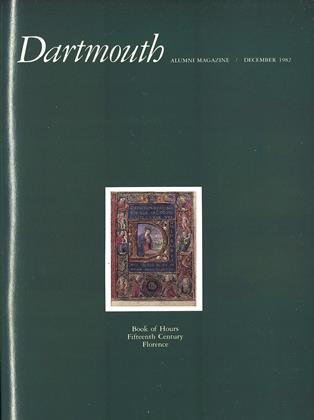There is a mini-joke in England to the effect that the Cabinet Minister with the title Lord Privy Seal is neither a lord nor a privy nor a seal. In the case of the first Director of the Dickey Endowment for International Understanding, however, every word applies, for Leonard Rieser knows how to direct, worked with John Dickey as few people were privileged to, is himself endowed with a rare blend of talents, and has logged more than a quarter of a million airmiles in the last eight years or so while helping to create international understanding in an area close to his heart the transfer of scientific and technological knowledge among the nations of the Western Hemisphere.
Over more than twenty years as Provost of the College and/ or Dean of the Faculty he played a critical role in building Dartmouth's current faculty and range of academic programs. One part of that experience which is especially noteworthy in this context is the emergence during his years as chief academic officer of the College of the off-campus language and foreign study programs and his role in nurturing them. His knowledge of Dartmouth's academic resources is, indeed, uniquely broad and deep.
As President of the American Association for the Advancement of Science, serving his three-year term in sequence with Glenn Seaborg, Roger Revelle and Margaret Mead, he joined with them in leading that organization into an increasing international commitment. He subsequently helped to launch Interciencia, a federation of associations for the advancement of science in a dozen countries in the Americas, a federation of which he is currently el presidente. As visiting scholar at Stanford University during the current phase of his Sabbatical year, he is reflecting on issues of science and technology policy, and on the problems related to the reduction of nuclear armaments, and in addition is re-acquainting himself with physics in the department from which he received his Ph.D. In the fall of 1983, after extensive travelling, he will begin full-time the work of ensuring that the Dickey Endowment lives up to its purpose and its promise.
Working with him will be three groups of people. The Executive Committee, the names of the members of which are given at the end of this publication, is engaged in the task of building the Endowment Fund up to its 810,000,000 goal. There will be an Advisory Committee of distinguished world citizens, and though it has yet to be constituted it will presumably manifest the same quality as did the choosing as informal counsellors during the planning stage of such people as George Kennan, Richard Lyman, the President of the Rockefeller Foundation, Roger Fisher of the Harvard Law School, William Clark, formerly with the World Bank, and Jonathan Moore, '54, Director of the Institute of Politics at the Kennedy School of Government at Harvard. And there will continue to be a group of interested faculty engaged in developing policy and programs in much the same way they helped prepare the submission requested by the Trustees which led to the creation of the Endowment among them Professors Gene Lyons, David Baldwin, Richard Joseph, Elise Boulding, Gregory Prince, Blanche Gelfant, Charles Hamm.
The long and eventful association with Dartmouth which began for Leonard Rieser when he arrived on campus as a freshman in the fall of 1940 may well have its most interesting chapter still to be written.
 View Full Issue
View Full Issue
More From This Issue
-
 Feature
FeatureOn Building Community
December 1982 By Mary Ellen Donovan -
 Feature
FeatureWhere They Hang Their Hats
December 1982 By Steve Farnsworth and Jean Korelitz -
 Feature
FeatureWindows on a World
December 1982 By Shelby Grantham -
 Article
ArticleDartmouth in the World
December 1982 -
 Article
ArticleRound the Girdled Earth...
December 1982 -
 Article
ArticleTHE DICKEY ENDOWMENT
December 1982
Article
-
 Article
ArticleD. O. C. Aids Byrd
November 1933 -
 Article
ArticleFraternities Close
August 1943 -
 Article
ArticleFour Involved in State Department Study
FEBRUARY 1971 -
 Article
ArticleCross Country
December 1956 By CLIFF JORDAN '45 -
 Article
ArticleNotebook
Jan/Feb 2004 By JOHN SHERMAN -
 Article
ArticleTHE GREAT AWAKENING
April 1934 By S. H. Silverman '34

